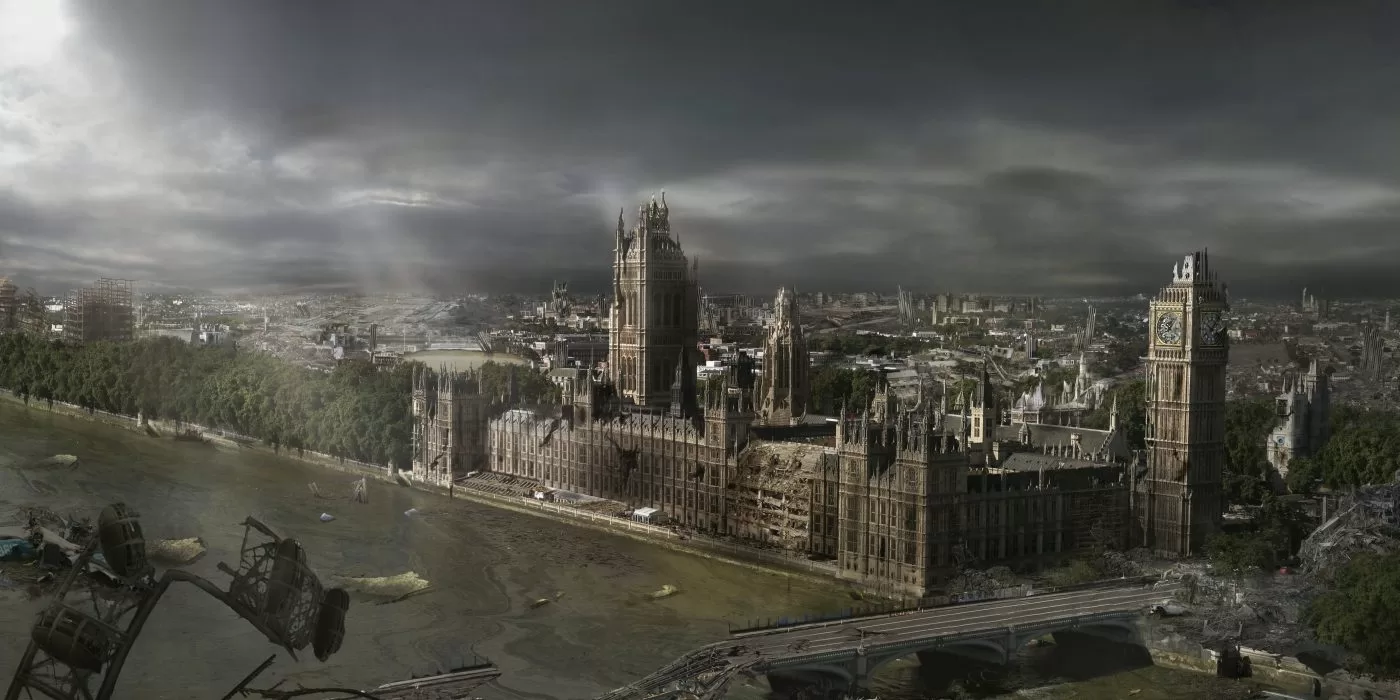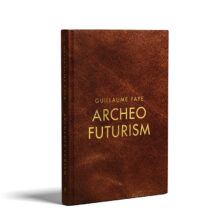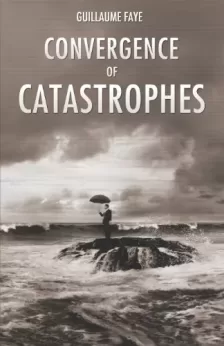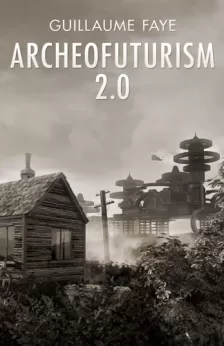To face up to things without expecting to profit: What could be more noble?
— Seneca
As soon as she understood that this was the end, Jeanne decided that the best thing to do would be to transmit a testimonial to her civilisation to future generations. It was useless to consider electronic formats — the old DVDs, the dead computers, the USB keys that were useless now that nothing could read them; the webcloud devoid of subscribers . . .
I
For a month, neither the Internet nor the telly, nor radios, nor smartphones, nor, apparently, even the electricity had been working. It was the great disintegration. There was nothing left but paper, and even this, being excessively acidic, would not hold out for long and would crumble to dust in thirty years.
So her eyes fell on the safe. Paper, she thought, could last a long time locked inside it. She gathered up everything she could, and packed the following into that small space:
An issue of Paris-Match, the last to ever appear, dated 5 June 2025, and soberly headlined ‘The End,’ with Paris in flames on the cover; an issue of Voici, two years out of date, with the obituary of Johnny Hallyday on the front page; her high school textbook on the history of France, her yearly planner with overview maps of France and of the world; a Bible, a copy of Homer’s Iliad, and collections of several European poets; Aristotle’s Politics, and various photographs: Mont Saint-Michel, the palace at Versailles, a view of the airport from Roissy, another from the towers of La Defense when they were still intact, a photo of the Earth taken by a satellite, etc.
But she worried that, despite her precautions, it all might fall into dust or be ruined by humidity. Then she remembered that, back when she was an adolescent, when she took a book-binding course, her teacher had told her that nothing was more resistant to time than letters engraved on soft leather, kept safe from humidity.
Her pretty Gucci calfskin jacket, purchased three years ago on the Corso in Rome for 1,500 Euros, would do nicely. It would have to be sacrificed. With a big tailor’s scissors she cut the back of the precious garment into a sheet, fifty centimetres square; she laid it flat on the dining-room table and sat down to carefully carve a text in stick letters with the point of a knife. She had to be concise:
Mont Saint-Michel, 23 June, 2025 A.D.
To the men of the future: My name is Jeanne Riquetout and I am witness to the very rapid end of a civilisation that was born thousands of years ago. This civilisation slowly expanded to cover nearly all of the Earth, which was populated by eight billion people. (She tried to avoid technical or complicated terms.) We can travel all over the planet thanks to our flying machines, and earthbound machines that go at great speed. We can see each other, talk to each other, write to each other from one end of the world to the other, thanks to other machines. We succeeded in going to the moon. We placed thousands of artificial satellites in orbit around the Earth. We exchange products from one side of the ocean to the other, between all peoples, thanks to immense boats that are 300 metres long. We make buildings as tall as hills. But our world is collapsing. This is the result of a pileup of catastrophes that began about ten years ago.’ It’s useless to go into details, she thought. No time.
Thinking of the Rosetta stone, which Champollion could use to decipher hieroglyphics thanks to the Greek version, she translated her text into the foreign languages she had mastered, Italian and English. By comparing the three, linguists of the future would have an easier time cobbling together a translation. She also supplemented her texts with diagrams and drawings, carved a bit amateurishly into the leather: an airplane, an automobile, two people conversing over distance with the help of a screen. She explained briefly what each drawing was. She copied out the alphabet, numbers, a few simple mathematical formulas. She drew a table of the metric system. All of this took an entire day. She had to hurry, because the ethnic bands of pillagers and defilers would not be long arriving at the Mont.
II
When she had finished, to be even more certain that the piece of leather would be preserved, she put it in one of the 100 percent waterproof bags that she sold in the boutique downstairs. It was supposed to also offer protection from humidity in the air. It was a soft cylinder of bright orange carbon plastomer. But there was some space left in it, and she had another idea: she jammed in the few precious jewels she had, her smartphone, mute and dark; it was now useless, but it might intrigue future archaeologists, if there were any, if civilisation ever asserted itself again. In its tiny volume, it carried the principles of telephonics, radio, optics, televisuals, electronics . . .
It wasn’t the fear of death that oppressed her, nor the hunger that began to torment her (she only had ten days’ worth of canned food left, and she was rationing), but the poignant nostalgia for what was already an ancient world. And above all, the haunting idea that this world-wide civilisation that was melting down in a world-wide fracas had been almost entirely constructed by men of European ancestry, the great cohort of her ancestors — whom all the other peoples had imitated. But they had allowed the virus to penetrate the organism, had tragically become too inimical to themselves, or too open to the world. She remembered having read, as a teenager, back when everything was still functioning — the beautiful days, the Indian summer — a few texts by authors who were forbidden by the fashion of the day, by censoring ideologues and judges, but who had predicted very precisely what was going to happen. Her father had managed to procure them under the noses of his military superiors.
She remembered a passage that explained that the very idea of a global civilisation was a deadly trap that could only end with the brutal implosion of the global system. She remembered a sentence that had struck her: ‘To try to unify a heterogeneous humanity into a homogeneous system will always end in an explosion.’
She still had the prescient book — a bit yellowed now — in which this reflection was written, and she hastily stuffed it in the cylindrical bag with the other objects. And suddenly, when she opened the safe, she saw the revolver, with its bullets still intact, and the brooch. And they took her breath away.
III
It was the service revolver of her great-great-great-grandfather, Amaury de Cinq-Fort, dead at Verdun over a century ago. The brooch, which had belonged to his spouse, Jeanne d’Albray, hid within it a Patek watch with a mechanism of gold, silver, and platinum. An extremely precious jewel. These two objects, according to the family’s tradition, must imperatively be handed down to its descendants without ever being separated from the bloodline. According to family legend, a fortune-teller had ordered her great-great-great grandmother to institute this strange protocol. A Greek, a certain Delphina Pythia, who titillated the emotions of high society at the end of the Belle Epoque, and who, they said, had predicted the wreck of the Titanic.
Fine, but Jeanne had never married and had no descendants. The revolver would be very useful for self-defence, and the watch could help her negotiate some favor, in this nascent world of primitive violence. However, she couldn’t make herself take these objects from the safe to appropriate them for herself. A strange power held her back. But what if the legend were true? What if the prophetess had intended for these objects to wind up precisely with her, a generational cul-de-sac? So that she could hand them down, not to her immediate descendants strictly speaking, but to the men of the future? Perhaps these two objects, the revolver and the watch, would have a destiny?
Jeanne put them in the bag and closed the safe. She cried silently. She went out on the second-floor balcony of the house and looked at the summit of the Mont, the spire that topped the abbey. It was already quarter till ten and the sun was setting on the bay, in bloody flames. But for several months already, no digital camera had been able to capture the scene. It was probably the last peaceful sunset. The death of the sun?
Not a gull nor a cormorant cried, as though they, too, had fled. All that could be heard was the sad hiss of waves retreating along the shore below, on a muffled breath of westerly wind. The bell tower of the Abbey sang, calling to one more prayer. The swan song. It rose up between the deserted, shuttered houses.
IV
For two weeks, panic had reigned. The population of Mont Saint-Michel had fled, not knowing where to go but hoping to end up somewhere. Faced with brutal chaos, the people, lacking memory, didn’t get together to resist, but dispersed and scattered. Even the little police squad, who were supposed to represent the State and defend the population, had deserted a month before, because the source of their orders — the State itself — had evaporated. It was every man for himself. During the long fall of the Roman Empire, a new defensive order had spontaneously created itself, a prelude to the Middle Ages. But now, nothing. It was chaos.
There were only about fifty people left on the deserted Mont, all of them old, like the prior of the abbey, two nuns, and an old monk. Not a single child. She was the sole representative of youth. But she made it her duty to remain. And anyway, where was there to go? She had accomplished her mission. The last bit of news from outside that she’d caught — by listening, via battery-powered transistor, to a radio station (France-Inter) that still broadcast one programme per night at eight, from Paris, in the basements of the Maison de la Radio, thanks to a generating set, had chilled her. The previous evening, the last inhabitants of the Mont, assembled in the village hall, had heard the flat voice of the lady presenter drone the final litany of the old world: ‘This is our last newscast. The President of the Republic has disappeared. Everyone, please try to regroup together if possible . . . (Sobbing) We too — we have to flee. Long live the Republic. Long live France! (Sobbing) Adieu.’
She went into the nave, where the Prior was chanting his pious incantations before the old people on their knees. He began to sing an Apostles’ Creed in a strong voice in Latin, accompanied on the organ by an old musician-monk who made the vaults shake. She wasn’t listening. She wouldn’t listen anymore. Even if it was magnificent. It was too late. Her eyes swept about the nave, the stained-glass windows, the delicate decorations under the powerful architecture. All of it would be gone before long. Broken, burned, or peeled away by the salty winds from the northwest.
V
She left the church and turned toward the high rampart. While leaving her house, the Bluebird, no doubt for the last time, with the premonition that she was going to die, she had heard a sort of clamor in the distance.
She looked at the raised walkway that linked the semi-isle to terra firma. No, it wasn’t one of those old and reassuring columns of tourists that she saw advance from the car park, in the last light of day, but a menacing horde of scruffy young men with bronzed complexions. There were about three hundred of them, she guessed, and armed, some of them with firearms. She could begin to make out their vociferations. She thought she could hear their war cry: Allah Akbar! They were coming there for pillage, murder, rape, desecration, and vengeance. For the kill. In the distance, well behind them, she could see a column of black smoke. Probably the village of Pontorson, whence they came and which they had burnt.
It would be perhaps twenty minutes before the barbarians arrived. She thought of suicide, of throwing herself from the top of the ramparts and into the Channel. But that would be beneath the honor of a descendant of the marquis of Cinq-Fort, who had died in combat. She slowly descended onto the pier, and walked with a determined step toward the herd of dark, ridiculous lunatics. She stood between them and the Mont, hands on hips, knowing she was going to die, raped and torn to bits. And she screamed at these scum as they advanced, a strange refrain she had heard in her childhood without understanding what it meant, but which, suddenly, became clear as the sun to her: ‘One day, Apollo will come back, and it will be forever.’















This short story presents a very plausible dystopia, unfortunately. I remember reading Oriana Fallaci’s warnings about Muslim immigration and the Continent’s devolution into a “Eurabia” well before Angela Merkel opened the gates to Europe even wider than they were before Fallaci died in 2006. This dreadful vision caused her to forsake her life-long leftist views. I wonder who else remembers her.